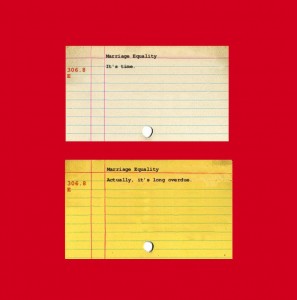
Equality Sign, by Emily Lloyd
I’m sitting in the jury assembly room in San Francisco thinking about two historical moments: today’s DOMA case at the Supreme Court, and the singularly principled action of the editorial board of the Journal of Library Administration, which resigned en masse after concluding that “it is not possible to produce a quality journal under the current licensing terms offered by Taylor & Francis.”
You probably understand the former issue as well or better than I do. You may need more context to understand JLAGate:
- Scholarly publishing is crucial for rank and tenure in many institutes of higher education.
- Authors and editors generally produce and peer-review their content for sweat equity–they do the work, their output is published, they get rank and tenure.
- Publishers charge libraries subscription fees ranging from modest to astronomical, with STEM journals the most breathtaking.
- Academic libraries, particularly research libraries, acquire some of their prestige from the size and quality of their journal collections — which makes Jenica’s carefully-planned decision to drop ACS all the more courageous.
At least within the last 100 years, the system worked, in an awkward manner. But in the last couple of decades, absurdly spiraling subscription fees have pushed the scholarly communications pyramid scheme into imbalance, forcing libraries to drop other purchases and services in order to maintain their collections.
Within this context, a new model for scholarly publishing, the Open Access movement, has grown from a tiny acorn to — if not a mighty oak — at least a sapling with clear promise. (A quick crash course: Wikipedia’s definition of Open Access; website of a key OA voice, Peter Suber; and Slate article on the potential impact of Aaron Swartz’ death on the OA movement.)
I think there are parallels between today’s history-making SCOTUS case (whatever happens, history has already been made, really) and this particular “crisis moment” in so-called traditional publishing.
Among other issues, those who are arguing on behalf of tradition don’t have as much history behind them as they claim. Until very recently, marriage was not a union of two equals; in the same vein, scholarly publishing as we know it today is a couple-three centuries old at best.
Another parallel is the rapid change in attitude. A decade ago, OA could be safely ignored. But in a very short span of time, attitudes have changed, and every historical moment, such as the death of Aaron Swartz, seems to grow the OA movement, not arithmetically, but geometrically, with key voices lining up behind OA.
That said, the journey to OA is neither linear nor bumpless for many people in higher education, especially those for whom traditional publishing is necessary or at least highly valued (with the caveat that the current model hasn’t been around all that much longer than same-sex marriage, given the longer arc of history). It is not the quality of OA publishing that is at question, it is the perception of its quality in the higher education community, where perception plays a huge role.
Things are changing, and in this blog post for the Chronicle of Higher Education, Â Brian Mathews, the would-be editor of the journal issue that atomized the JLA board, struggles out loud with his thoughts. Â I give Brian credit for his frankness as he (like Justice Kennedy) struggles openly with a new concept that he clearly is open to (no pun intended) but is still wrapping his head around.
None of us have all the answers in the shift to open access, and for those of us who have published a lot in the traditional model, please excuse our caution. As an essayist who has published a number of essays in well-respected non-OA literary venues, I don’t feel comfortable telling anyone what rights their works should have. (Which is congruent with my views on same-sex marriage, where I champion the right to choose who we marry.) But I do see OA as a tremendously beneficial development that — like gay marriage — has both a rightness and a certain inevitability to it.










@kgs This is brilliant, Karen! Love the “traditionally defined” parallels.
What a wonderful post — love the parallels. Another personal parallel is the awkward and messy decision to try to accomplish change from within traditional structures, while simultaneously hoping and sometimes working towards more radical changes. I was in this position while serving in the US Army — working for changes in attitude and policy with regards to gender and sexual orientation. Anyway — thanks for pointing out the parallels.
Absolutely fantastic post, thanks! “@kgs: Marriage Equality, Open Access, and Jury Duty http://t.co/43Tv1SwNL9â€
Well in the last couple of decades the subscriptions for these articles are for main gain to fill the greed in the apatite’s. I do miss the library’s of old, and the traditional system for scholarly articles.